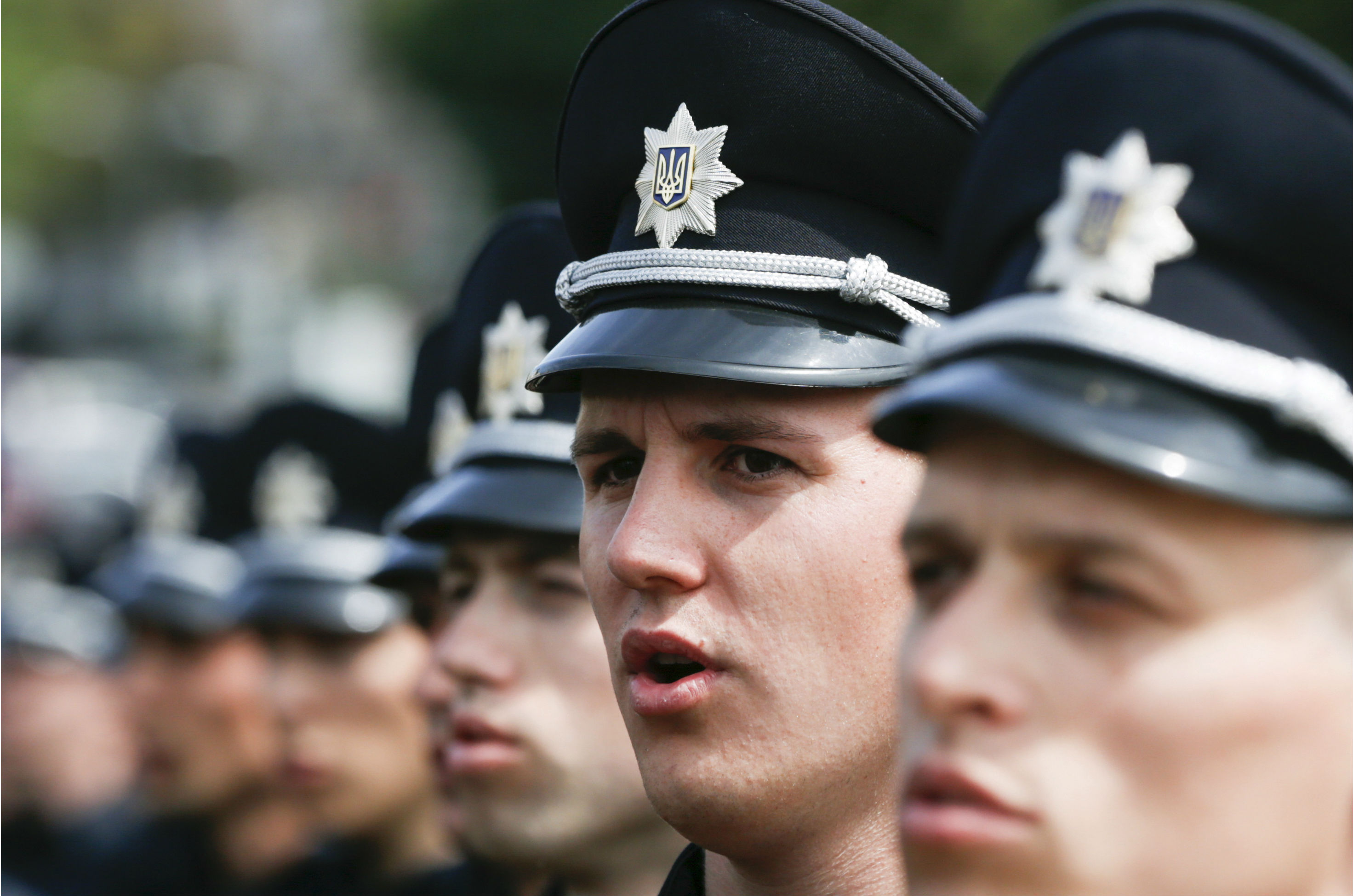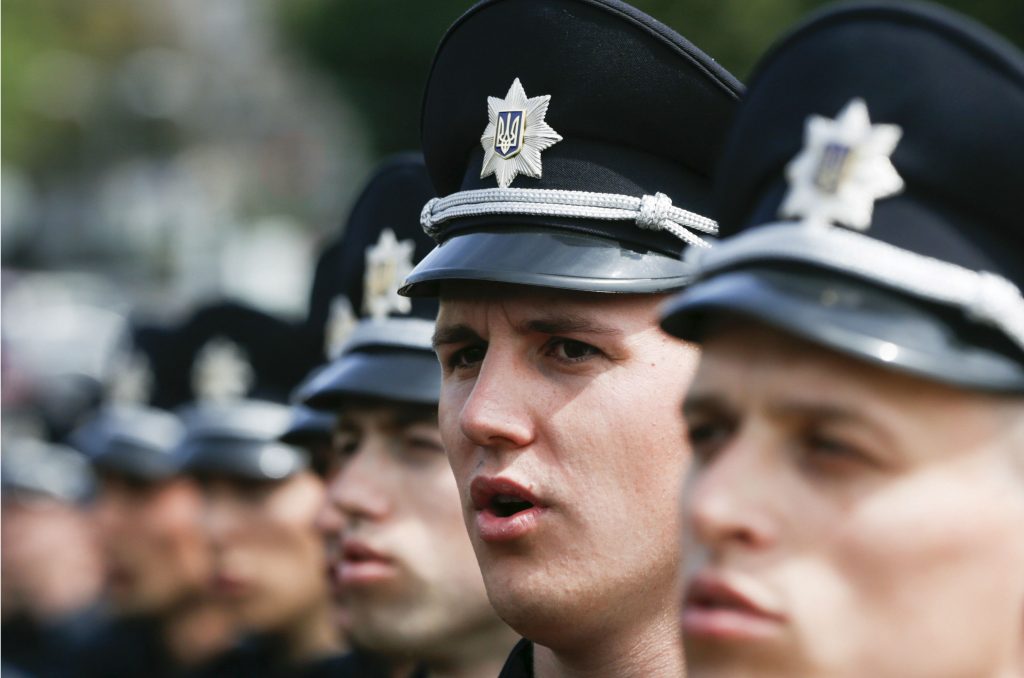
The reorganization and reform of Ukraine’s catastrophically corrupt police force was the top priority when President Petro Poroshenko appointed Eka Zguladze first deputy Interior Minister of Ukraine. Poroshenko wants to emulate the relative success that Georgia’s Rose Revolution reformers garnered in modernizing their small post-Soviet country. Zguladze is just one of the many Georgians who have been drafted by the new Ukrainian government to kick reforms into high gear.
In January 2015, Ukraine’s Ministry of the Interior began recruiting the first of approximately 2,200 new patrol officers in Kyiv. The first battalions were inaugurated on July 4. The rigorous selection process included a ten-week training program accompanied by a battery of exams. In an effort to ensure moral rectitude in the new force, the officers are paid almost $400 a month, roughly three times more than new recruits previously made.
The glistening new patrol police can also be seen cruising the streets of Cherkasy, Kharkiv, Lviv, and Odesa. By the end of the year, there should be at least 10,000 new officers.
American and Canadian trainers provided state-of-the-art training and equipment. The newly reformed police were carefully instructed to be polite and, in marked contrast to the previous force, only use force with cause. The photogenic new cadres proved to be wildly popular, especially in Kyiv, and spawned a cottage industry of laudatory news articles about the populace lining up to take photos with them.
However, some influential Ukraine experts have argued that police reform is of relative insignificance in comparison to the scope of the nation’s wider corruption issues. In addition, more than 100,000 of the old police remain on the job, and Ukraine has more than four times as many security officers per capita than comparable West European countries. Police forces operate on a mafia-like system of tributary patronage. Much like feudal vassals, law enforcement agents are expected to deliver a set amount of tribute to their commanding officer each week. Each rank kicks up tribute to the rank above it, forcing officers to extract the required amounts from citizens in the form of coerced bribes. The result is universal complicity, with the rot rising to the highest levels of the force. Without a wholesale purge of the old corps, the argument goes, any change is akin to applying a band aid to a gangrening limb.
Those arguments certainly have merit, but they fail to understand the visceral symbolic importance of the actual experience one has when encountering the new police instead of the old guard (with whom one tried to minimize interactions at all cost).
My wife and I had our first experience with Odesa’s new police last week. It was admittedly anecdotal and perhaps random, yet it left us exceedingly impressed.
At 2:30 am on November 3, I was pleasantly immersed in my writing and oblivious to the raucous scène de ménage taking place between the neighbors. Abruptly, my wife strode out the front door in her slippers and bathrobe. Neglecting to relate her intentions to me, she marched purposefully down the stairs. I barely caught up with her before she began knocking on the neighbor’s door. When the door creaked open, she warned them in no uncertain terms that they had five minutes to stop shrieking before she would call the police. “Wait for me the next time you do that!” I reproached her worriedly. Unflappable as only a French-educated daughter of an Odesa sailor and now filmmaker could be, she riposted that she could handle her own conflicts.
Our clamorous neighbors did not put an end to their fracas and my wife followed through with her promise. Ten minutes later, a pair of good-looking and clean-cut young men in their late twenties arrived. Surprisingly, they had distinctly unpolice-like manners. After having a stern talk with the neighbors, the exceedingly polite officers in their snazzy blue American uniforms and peaked caps arrived at our door to complete the complaint form.
The officers were nothing like the arrogant, paunchy, agitated, ill-mannered officers with greasy uniforms that one was used to. Slim and athletic, they also spoke grammatically correct Russian and Ukrainian.
They read our rights to information under the Ukrainian constitution and asked us to sign the complaint. Afterwards, they made small talk and politely inquired where they could see my wife’s films.
Every previous encounter with Ukraine’s Security Service or police I’ve had has concluded with a radically unpleasant denouement. That is with them being flippantly nasty, demanding a bribe, or deploying domineering power maneuvers for the simple sadistic thrill. Once as I was passing through Kyiv’s Boryspil airport several years back, a border guard informed me that he could strip me naked, confiscate my property, and beat me with a stick if he felt like it. In most civilized countries, that approach would be considered a case of egregiously bad manners as well as being manifestly bad for business.
Instead, the new recruits smiled at my jocular inquiries about their California police trainers and laughed at my jab about having paid for their uniforms as an American taxpayer. The old militsiya would have clubbed me on principle. They gamely discussed their training at 3 am—the black beating heart of the journalist never ceases beating—and addressed my queries as to whether they had successfully gotten rid of the pro-Russian influences and sympathizers in the force. By the time we had filled out the complaint, I was about ready to invite them in for a nightcap.
Vladislav Davidzon is a Russian-American artist, writer, translator, and critic who lives in Odesa, Ukraine.
Image: Police officers sing the national anthem during an oath-taking ceremony, which started up the work of a new police patrol service, part of the Interior Ministry reform initiated by Ukrainian authorities, in Kyiv, Ukraine, July 4, 2015. The new service, which includes road, metro and foot patrols, is expected to replace the traffic police, widely associated with disrepute and corruption, according to local media. Credit: REUTERS/Valentyn Ogirenko
